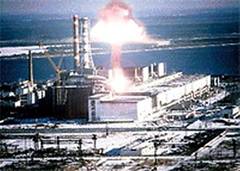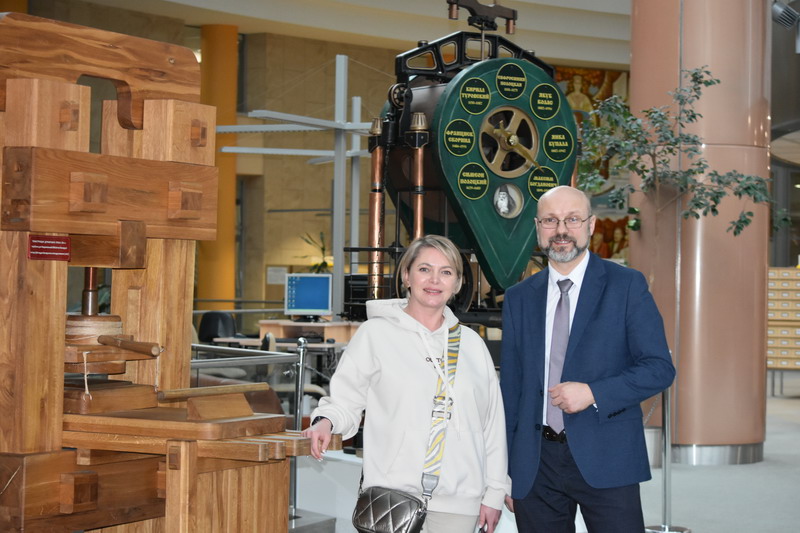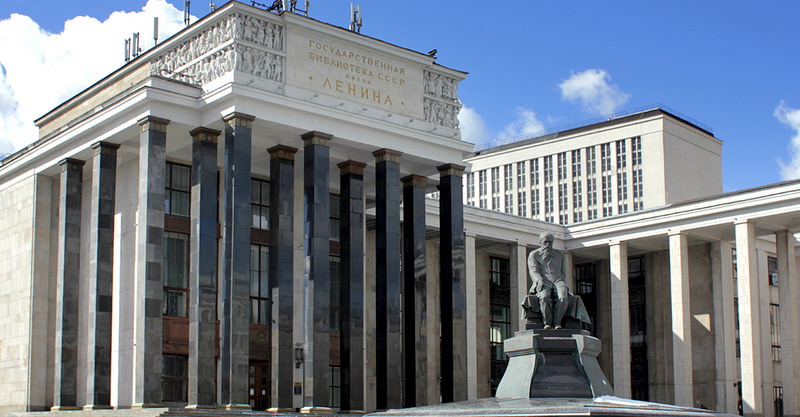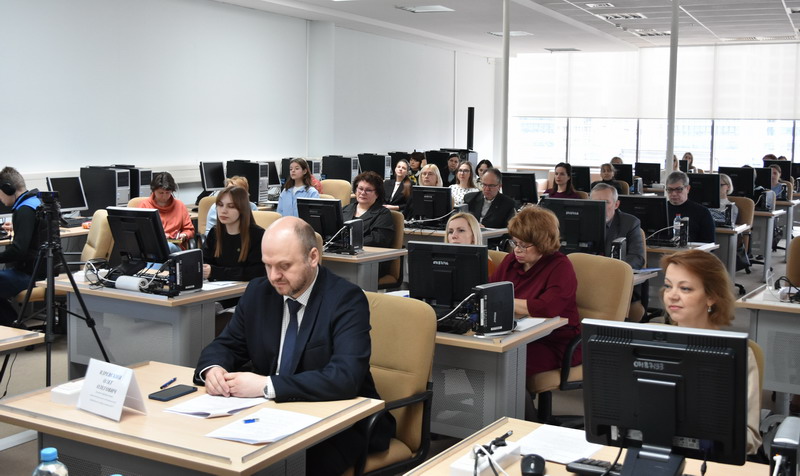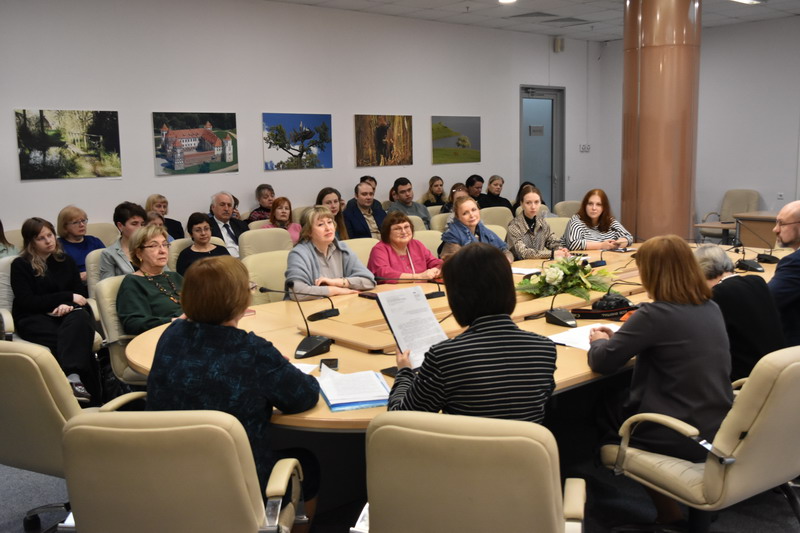A subject exhibition "The global catastrophe is a national disaster” timed to the Chernobyl disaster 25th anniversary runs at the National Library of Belarus (room 207g) from 14 April to 16 May.
The Chernobyl disaster which is considered the worst technogeneous accident in the history, occurred on 26 April 1986 at the Chernobyl Nuclear Power Plant located near to Pripyat (Kiev region, Ukraine). An explosion and fire on the fourth power unit released large quantities of radioactive contamination into the atmosphere (300 timed more than after Hiroshima bombing in 1945). About 70% of nuclear fall-out had dropped out in the territory of Belarus; therefore its contamination level is actually the highest of all the countries which had suffered from the disaster. The quarter of Belarusian regions (23%), 7% of Ukrainian regions and 1,5% of Russian regions had undergone radioactive pollution. Due to transboundary transport of nuclear contamination many remote areas in Eastern Europe and Soviet Union had been affected as well.
The Chernobyl accident had exerted an enormous influence on human life and Belarusian economy, science and culture of Belarus. About 2 million people, including more than half a million children suffered. The economic damage to Belarus made 235 billion dollars. The country lost about one fifth of its agricultural lands and about a quarter of forests. On Chernobyl area of effect about 350 industries, 95 hospitals, 54 large agroindustrial associations, 600 schools and kindergartens and 550 trading enterprises and services closed down.
The Chernobyl tragedy has given a stimulus to the development of the international cooperation in which participate not only the governments and the international organizations, but also doctors, scientists, and common people – all those who is united with aspiration to help victims of the Chernobyl accident. The international cooperation in the field of elimination of consequences of the Chernobyl disaster is of great importance: the experience of teamwork can be used in other countries whose population faces destructive consequences of the technogeneous accidents, wars and civil conflicts.
A significant volume of work in the sphere of experience accumulation and the development of recommendations on the elimination of consequences of the Chernobyl accident is carried out within the frameworks of the United Nations Organization. In 2003–2005, the UN Chernobyl Forum was founded under the initiative of Belarus, Russia and Ukraine. The Chernobyl Forum reports on medical, ecological and social and economic consequences of the Chernobyl accident are of great importance for search of the ways of the elimination of its consequences.
The United Nations General Assembly declared the third decade after the Chernobyl accident (2006–2016) the Decade of Recovery and Sustainable Development for Communities Affected by the Chernobyl Disaster (resolution A/RES //62/9). The purpose of the Decade’s program is to consolidate the international efforts to overcome consequences of the Chernobyl accident.
The international aid to Belarus is the extremely important component of an effective overcoming of consequences of the Chernobyl disaster and recovery of affected regions. The amount of financial aid to Belarus makes at the moment more than 50 million dollars. Besides, Belarus annually receives about 50 million dollars as gratuitous humanitarian aid from charitable organizations and private persons.
At the same time, it is not enough for the complete recovery and steady development of the affected regions. The total amount of aid from abroad along with national investments (about 18 billion dollars) makes only about 8 % of the total amount of economic damage.
More than 70 books, booklets and periodicals in Russian, English and German are on display.
The exposition includes the subject sections as follow:
- Chernobyl disaster: the global impact;
- Ecological, social and economic consequences of the Chernobyl disaster;
- Social and health consequences of the Chernobyl disaster;
- International cooperation for the elimination of consequences and the recovery of regions affected by the Chernobyl disaster.
The exhibition is designed for medical workers, ecologists, sociologists, economists, specialists in atomic power and international relations, university students and professors.
Useful links
- Chernobyl Department of the Belarusian Emergencies Ministry
- Countries and organizations cooperating with the Department
- Acting and complete international projects and programs coordinated by the Department
- Chernobyl: consequences of the catastrophe in Belarus
- Atlas of current and forecasting consequences of the Chernobyl disaster
- Chernobyl Database
- Belarusian Office of the Russian-Belarusian Information Center on problems of consequences of the Chernobyl accident (BDRBIC), the Institute of Radiology of the Belarusian Emergencies Ministry
Russian and Ukrainian sites
- The Russian Emergencies Ministry (EMERCOM of Russia)
- The Ministry of Emergencies of Ukraine
- Chernobyl Union of Russia
- Pripyat website
- The Nuclear Safety Institute of the Russian Academy of Sciences
- The Institute of Global Climate and Ecology of the Russian Academy of Sciences
- The All-Russian Center of Emergency and Radiation Medicine of the Russian Emergencies Ministry
- Medical Radiological Research Center of the Russian Academy of Medical Sciences
- P. V. Ramzaev Saint - Petersburg Research Institute of Radiation Hygiene
- Federal State Institute "Saint Petersburg Scientific and Practical Center of Medical and Social Expertise Prosthetics and Rehabilitation of the Disabled"
International organizations
- UN: Chernobyl Disaster
- UN Office for the Coordination for Humanitarian Affairs (OCHA)
- International Atomic Energy Agency (IAEA)
- United Nations Scientific Committee on the Effects of Atomic Energy (UNSEAR)
- International Chernobyl Radiological Portal
- Chernobyl: Assessment of radiological and health impact
- The European Commission
- The Health Costs of Low-Level Ionizing Radiation
- Chernobyl, 25 Years. Safety for the Future. – The International Conference
 |
 |
 |

